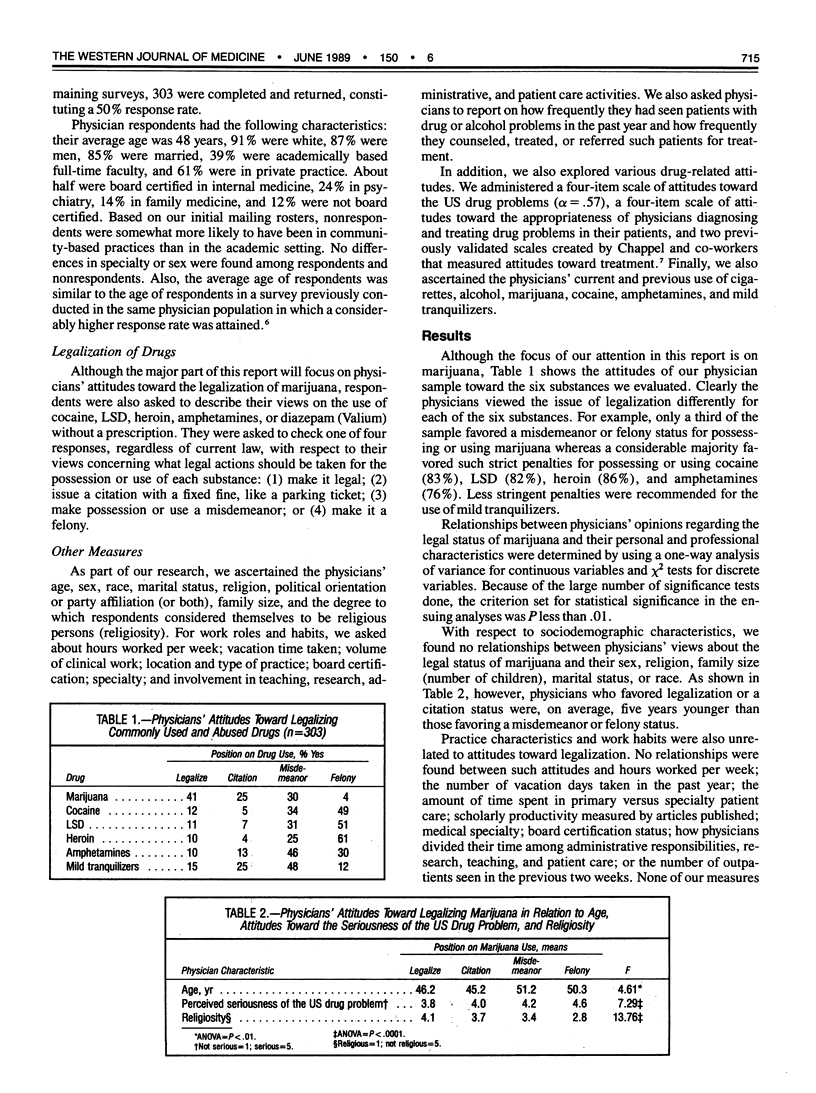Abstract
We asked 303 practicing physicians in general internal medicine, family medicine, gastroenterology, or psychiatry to indicate whether possessing or using marijuana should be considered a felony, a misdemeanor, warrant the issuance of a citation, or be legalized. The position physicians advocated was unrelated to their specialty, experience diagnosing or treating substance abuse problems, their attitudes toward the efficacy of the treatment of drug abuse, or any other work role or habit we measured. Legalization or citation as compared with harsher penalties, however, was more likely favored by physicians who were younger, less religious, politically more liberal, and those less likely to perceive a serious drug problem in society. Legalization was also more likely favored by physicians who themselves had used marijuana, cocaine, and amphetamines but was unrelated to the use of alcohol, cigarettes, or tranquilizers. Although physician opinion should be sought as society deals with the drug problem, this study suggests how physicians' characteristics may influence the opinions that are rendered.
Full text
PDF



Selected References
These references are in PubMed. This may not be the complete list of references from this article.
- Chappel J. N., Schnoll S. H. Physician attitudes. Effect on the treatment of chemically dependent patients. JAMA. 1977 May 23;237(21):2318–2319. doi: 10.1001/jama.237.21.2318. [DOI] [PubMed] [Google Scholar]
- Chappel J. N., Veach T. L., Krug R. S. The substance abuse attitude survey: an instrument for measuring attitudes. J Stud Alcohol. 1985 Jan;46(1):48–52. doi: 10.15288/jsa.1985.46.48. [DOI] [PubMed] [Google Scholar]
- Lehman W. E., Cole S. G. Treatment staff attitudes toward the combined treatment of drug and alcohol abusers. Am J Drug Alcohol Abuse. 1982;9(1):77–93. doi: 10.3109/00952998209002612. [DOI] [PubMed] [Google Scholar]
- Linn L. S. Physician characteristics and attitudes toward legitimate use of psychotherapeutic drugs. J Health Soc Behav. 1971 Jun;12(2):132–140. [PubMed] [Google Scholar]
- Linn L. S., Yager J., Cope D., Leake B. Health status, job satisfaction, job stress, and life satisfaction among academic and clinical faculty. JAMA. 1985 Nov 15;254(19):2775–2782. [PubMed] [Google Scholar]
- LoSciuto L., Aiken L. S., Ausetts M. A., Brown B. S. Paraprofessional versus professional drug abuse counselors: attitudes and expectations of the counselors and their clients. Int J Addict. 1984 May;19(3):233–252. doi: 10.3109/10826088409057179. [DOI] [PubMed] [Google Scholar]
- McAuliffe W. E., Rohman M., Santangelo S., Feldman B., Magnuson E., Sobol A., Weissman J. Psychoactive drug use among practicing physicians and medical students. N Engl J Med. 1986 Sep 25;315(13):805–810. doi: 10.1056/NEJM198609253151305. [DOI] [PubMed] [Google Scholar]


